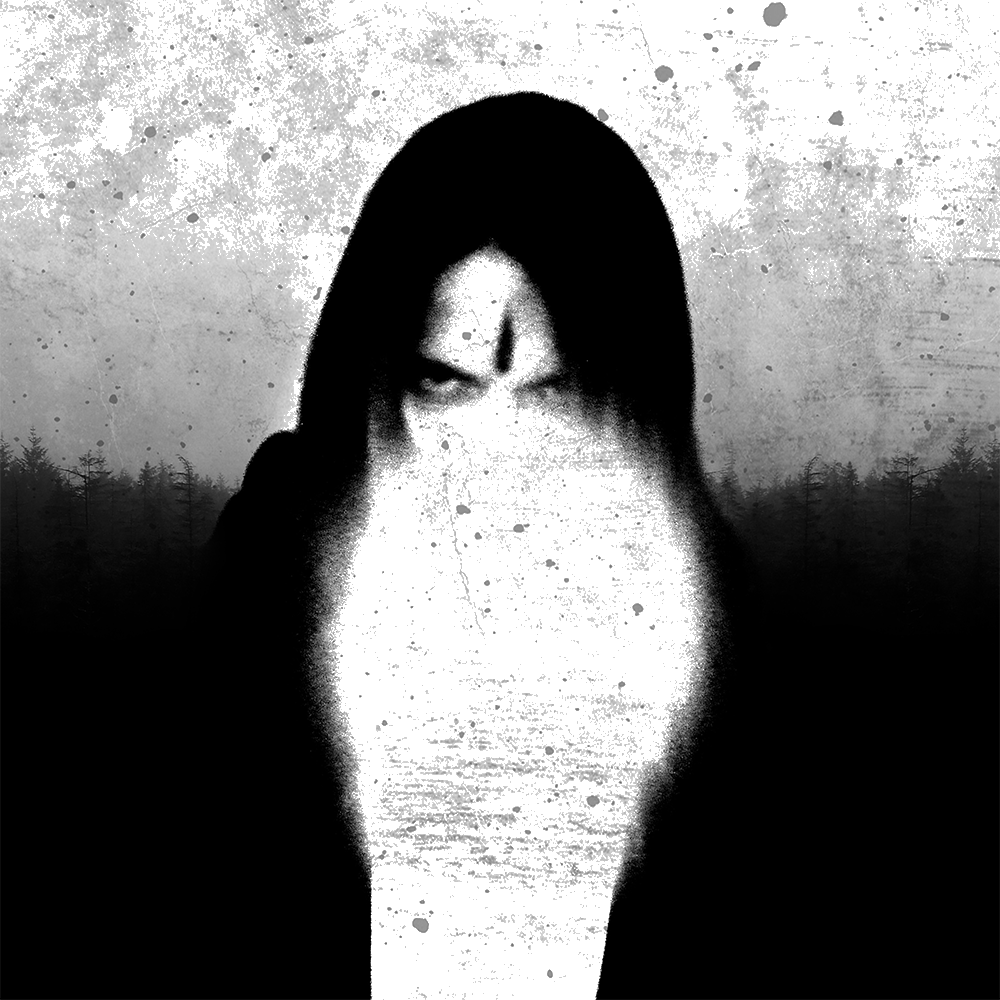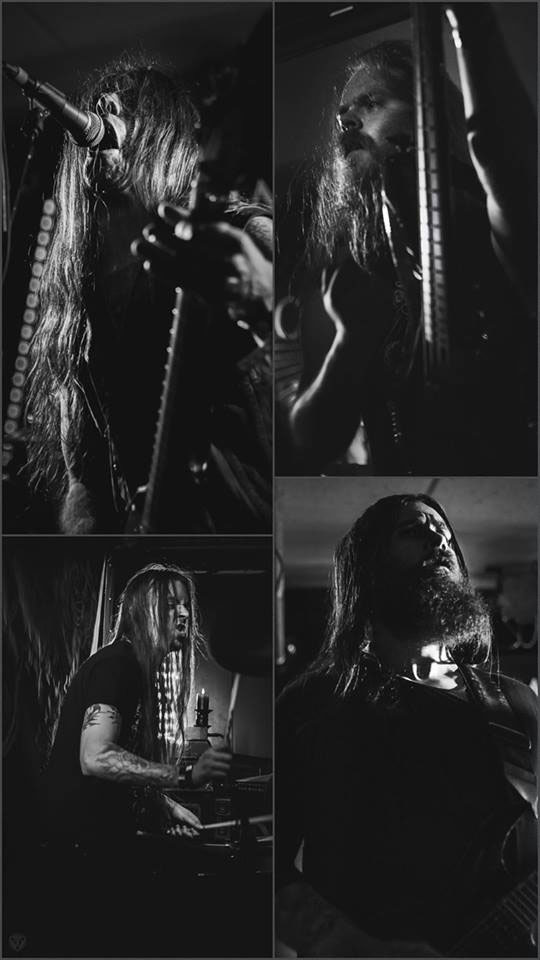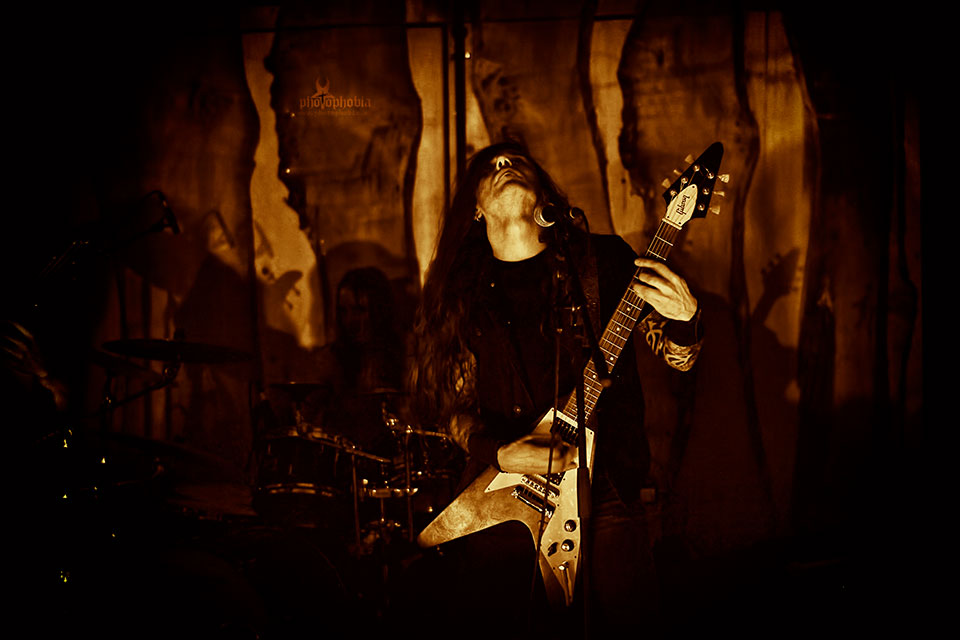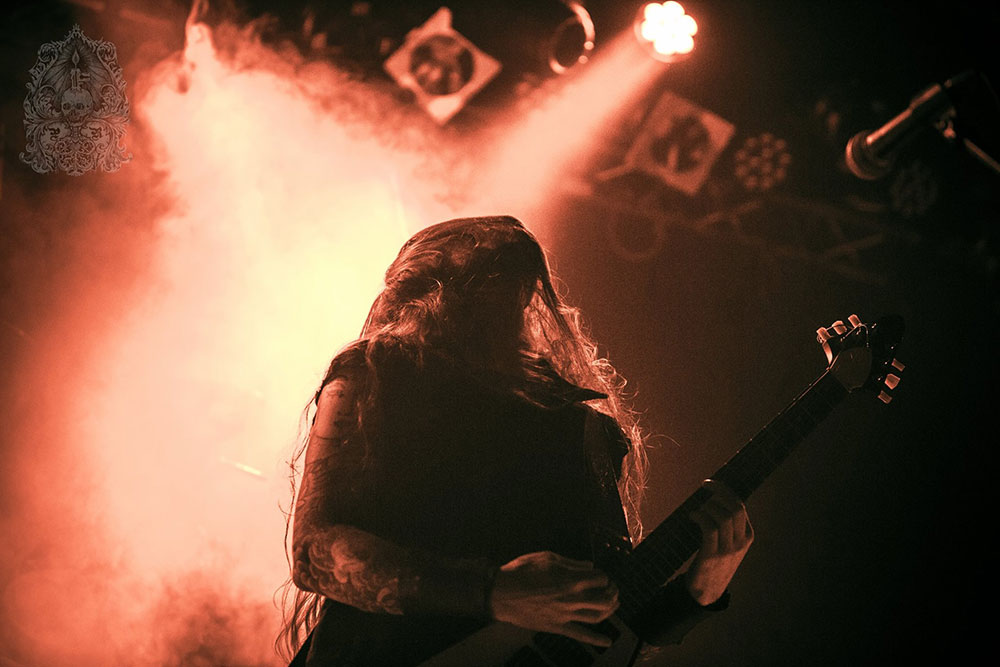Slidhr
2017-06-14
by Niklas Göransson
Misanthropic musings over solar annihilation and the thraldom of society; a frank discussion on animal rights and environmental retribution with Joseph Deegan of Irish/Icelandic black metal band Slidhr.
– We’re currently preparing our second full-length album. I usually record pre-production demos as foundations to refine and develop further, which is what we’ve been doing lately. The last year or so has been spent writing and shaping various ideas from my subconscious.
Since drawing forth and building upon obscure aspects of his person is a significant part of the creative process, birthing a SLIDHR album can be a fairly taxing affair for guitar player and vocalist Joseph Deegan.
– I often struggle to manifest glimpses of the greater picture, so it’s been quite tiring but also cathartic once fully realised. The relief is usually short-lived though, and the old familiar urge to do it all over again returns with a vengeance. Hence, SLIDHR will soon enter the studio.
The album will be recorded over the coming months, between Reykjavík – where most of the line-up resides – and Joseph’s home town of Dublin. The Icelandic connection came through long-time cohort Stephen Lockhart, an Irishman now residing in the small Scandinavian island nation. Besides being the live guitarist of SLIDHR, Lockhart is the owner of Studio Emissary and operates solo-project REBIRTH OF NEFAST.
– It’ll be more of a typical band affair this time as live bassist Garðar (Jónsson, ALVMYRKVI, SINMARA) will join myself and Bjarni (Einarsson, drums – SINMARA, WORMLUST) on the recording.
After twelve years as a mere recording project, Joseph brought SLIDHR to the stage in 2013. He mentions past experiences of playing live with previous bands as a contributing factor to his initial reluctance.
– Playing live was a constant disappointment. Preparations were stressful and time-consuming with basically zero reward at the end of it. As a kid I’d see my favourite bands play and aspired to do what they did, so imagine the anti-climax…
Having only played domestic gigs back in those days, he refers to the dreadful standard of Irish concerts as a strongly contributing factor to the inevitable and massive post-gig dissatisfaction. After finally having had enough, he stopped playing live entirely for almost a decade.
– The notion of doing something special and conjuring real passion in a live setting still appealed to me greatly. Unfortunately, I’d only caught vague glimpses of this with my previous experiences. Then in 2013, after the release of “Deluge”, we decided to make it a reality.
SLIDHR has played quite a few gigs since then – and while some have reminded him of terrible experiences of the past, he says that overall it’s been fulfilling.
– It’s as if we’re breathing life into the music, animating the monster. I personally tend to get lost in what I’m playing, but only when the correct elements align. It’s like magick to me, creating an altered state. That said, we’ll be far more selective regarding gigs from now on – playing live just for the sake of it isn’t all that interesting.

Having visited Dublin on many occasions throughout the years, my observations indicate that Joseph has never been much into hooting and hollering to MANOWAR in Bruxelles at 2am. As has been known to happen.
– I spent plenty of drunken nights headbanging to heavy metal as a teenager but that didn’t last very long. The effects of alcohol stopped working and it simply made me aggressive – when that happens it’s better to just not drink.
Alas, not imbibing oneself makes it dreadfully tedious to spend time in company of the inebriated.
– This means little to no contact with people socially over here, since the stereotype of the drunken Irish is fairly accurate. My dogs are far better company anyway.
So it’s a fair assessment that you’re not much of a social butterfly?
– I’d say that’s more than fair, yes. The more time spent around people, the more I realise why I avoid them. I see very few redeeming features in present-day society. My very small social circle came about organically, and I’d prefer to keep it that way.
Joseph says he’s identified as a misanthrope for most of his life now, and it’s a trait which defines him as a person. Just as most teenage haters of humans are, he recalls being told in the most patronising manner that ’you’ll grow out of it’.
– Well, I can assure you they were incorrect. I’ve dedicated a vast part of my life learning to function in a society I detest in the midst of a species I despise, and it never gets any easier. Being forced to live as we do in this world has moulded and poisoned me.
He’s even gone so far as to sever ties with family and most acquaintances from his younger days, citing a complete lack of affinity and instead regarding them as part of a greater problem.
– However, this doesn’t mean I walk around being a dick to people. Such behaviour serves no purpose other than ruining your own day and contributing to an already bleak life. All of us were forced into this prison-like existence, and there’s no reason to make things any worse than they need to be.
I read in a previous interview how Joseph commented, ‘Fuck governments and fuck the police.’ I’m curious if this is to be taken literally, meaning if he genuinely wants to do away with both state and its judicial enforcement.
– Do you like living as a slave? I most certainly don’t… but make no mistake, that’s exactly what we are – slaves. Have you ever tried to stop paying taxes? If so, you’ll very quickly find that you’re not a free man. Governments play a game of dominion and the police are henchmen carrying out their dirty work.
It’s not even about greed, he says, since the governing class already has all the finances in the world – literally being able to print cash at will, or simply adding a few zeros to a number on a computer screen.
– Money is merely an illusion used to shepherd the populace, it’s about total control. This ritualistic suffering inflicted by the self-appointed elites goes beyond capitalism. Of course, speaking of such matters one will undoubtedly be labelled a conspiracy nut job – but if you can’t see this then you must be pretty ignorant.
Often when I see black metal bands promulgating anarchy, chaos and general unrest, I grow curious as to how said musicians would thrive in such conditions. While valuing both The Road and Mad Max as artistic concepts, I can’t profess to any greater desire of residing in either scenario.
– Longing for the collapse of this pseudo-democratic slavery doesn’t necessarily mean the only alternative is a barren wasteland. On the contrary, we could live in a far more natural state. Perhaps more primitive, but how is this a bad thing?
Joseph points to how Western society is constantly becoming more technologically advanced, yet simultaneously appears to get increasingly dumbed down for each so-called progression.
– You hit the nail on the head though; most black metal musicians who harp on about bedlam and lawlessness would be pretty unwilling to give up their comfortable lives in the suburbs. You’d know this better than most, coming from Sweden…
I would?
– I’ve been to those comfortable taxpayer-funded rehearsal studios with government subsidised instruments. Not that I’m claiming this to necessarily be a bad thing, it’s just easy to talk about being a satanic hooligan when you’re never made to go hungry. Whilst undoubtedly a comfortable existence in many ways, it’s difficult to ignore the ongoing emasculation and hammer of political correctness prevalent in such milieus.

It’s not entirely beyond the realms of reason that Joseph will see these depopulatory desires realised in his lifetime. A quick glance at contemporary global events would indicate the probability of nuclear conflict never having been higher.
– There are cleaner ways to exterminate human life, I’d much rather see a solution which allows the Earth to carry on without us, an organic cleansing instead of something man-made. Every so often there are new scares involving asteroids or a coronal mass ejection about to annihilate us, but so far it’s been limited to wishful thinking.
Coronal mass ejection (CME) occurs when the sun releases large amounts of plasma and magnetic fields, which are then carried into space by solar winds. Getting in their way is strongly inadvisable, which is what’s believed to have happened to Mars; vaporising the planet’s oceans and terraforming its surface into a lifeless crimson desert. Smaller CMEs hit earth from time to time, causing interference in global communication services, airline control and power grids. The largest ever recorded was on September 2, 1859 – it lit up the sky with auroras brighter than the moon and knocked out telegraph systems with such force that operators were electrocuted by their own equipment. Were this to happen today, it would instantly wipe out electricity all over the world and likely take several years to restore.
– The knock-on effect would potentially prove apocalyptic, when computers controlling our nuclear power go offline. Some people would say this would never happen, but if you’ve followed solar weather activity you’ll know it’s not exactly a stretch of the imagination that it’ll come sooner or later.
Given Joseph’s distaste for his species but intense reverence for the Gaia, let us explore the bond between them. Might we be intrinsically linked somehow – after all, we find ourselves with an entire biosphere to support us; four billion years of earth evolution has produced the perfect climate for our species. Since hominid DNA has to a large extent been shaped in adaptation to its terrain, terms such as ‘Mother Nature’ might not be all that preposterous.
– The indiscriminate manner in which nature can put us in our place is fascinating and commands an incredible degree of respect. At some point, we became detached from our connection with the environment. For reasons I can’t even begin to fathom, humanity clearly has a superiority complex.
He says we at one point were undoubtedly as much a part of the Earth as any other species inhabiting it – but not any longer. Instead, the hominid insists on trying to dominate its surroundings rather than accepting its place therein.
– While at a glance it may appear as if we’re doing a fine job of killing the planet, it doesn’t take much in the ways of ‘natural disasters’ to knock us back. Walking alone in the forest, I feel both at home and intrusive. There’s a part of the subconscious which recognises how ill-suited we are to ‘civilised’ life, longing for re-connection with the self and nature.
Joseph says he senses a palpable hostility from our environment, which stems from our lost instinct.
– We’ve changed along the way – dumbed down, and we’re no longer welcome. This is what fascinates me. Those incapable of reading signs presented to them will at least feel the full repercussions. It’s beautiful, the indiscriminate mass culling of an invasive species unable to take a hint.
He points out our historical tendencies of trying to relate to and understand certain forces of nature by anthropomorphising – meaning, ascribing them human form or attributes.
– Although this may be seen as somewhat primitive, at least it was acknowledgment of greater powers – be they the Fomorians, the Jötunn and so on. The humankind of today is far too egotistical to even accept that we’re not on top of the food chain.

While Joseph has little mercy in his heart for humanoid lifeforms, he’s far more sympathetic to the plight of animals. Our existence, he explains, is parasitic.
– Take a look at the people around you. Whether you’re at work, in a bar, or sitting at home with family – anywhere. Now think about the fact that countless animals die just so these pieces of shit can live. What makes them special? Have they really done anything to warrant brutally killing genuinely innocent animals? Sorry to break it to you but you’re not that special and your life isn’t worth it.
Joseph says he spends most of his free time caring for animals who’ve been rescued from the most horrible human-imposed conditions imaginable.
– I don’t differentiate between a dog, cat, bird or pig – sentient beings who’ve done nothing to deserve the hell they were born into. Most people I meet appreciate dogs and wouldn’t like to see them being abused, but try to apply the same logic to a pig or a cow and you’re somehow an ‘extremist’.
He’s been fully vegan since 2005 or so, and claims not to miss out on anything.
– I eat slightly adjusted versions of whatever I want. Should I so wish, all of the metal fashion necessities are available to me; boots, leather jackets and so forth – the only difference being no animals were slaughtered. Is it really a difficult choice?
Joseph stresses that while wholeheartedly supporting full abolishment of animal abuse, he has little in common with the stereotypical proponent of the vegan philosophy.
– In no way do I fit into the passive-aggressive, pacifist cliché the word tends to be associated with. To me, animals are the link between us and the wild – there’s something we’ve lost they still possess. I speak on behalf of their rights, not those of humans. I’ve discarded imaginary boundaries such as religion and nationality in favour of a basic outlook in which someone’s treatment of animals says far more about his or her calibre.
He says the few vegans he’s met within the black metal scene have almost concealed the fact so as to not leave themselves open to ridicule. While some degree of environmentalism is commonplace, presumably a heritage of the genre’s seemingly inherent reverence for nature, animal-centric ethics are not.
– It’s very trendy right now to use animal blood as part of ‘occult’ stage shows. Guess what kids, you’re not occultists and those are not rituals you’re performing. You play second-rate black metal to escape from shitty lives, and the blood and animal heads were procured from the local supermarket – as feral as ketchup. Try human blood next time, preferably your own.

Another interest of Joseph’s I wanted to discuss is a congregation within the Catholic Church called The Society of Jesus. Likely better known by the name of its followers – the Jesuits have historically been heavily involved in apostolic evangelisation, and in the process made themselves the centre of some controversy.
– They do indeed have an interesting history, and one which is still largely hidden from most people. For instance, I discovered how the Jesuits practised various kinds of trance states from different traditions. When you see paintings of hooded monks meditating over a human skull, you’ll typically find the weak explanation of them ’contemplating their mortality’.
So what are they doing?
– It doesn’t take a whole lot more research to figure out they were practising black as well as white magick – the Jesuits were an elite esoteric secret society. Which also brings us to Tibetan Buddhism, where human skulls are used in their Left Hand tantric rituals.
Joseph explains how according to tradition, skulls contain varying degrees of arcane potency dependant on the manner of its proprietor’s passing.
– The skull of an old person who died peacefully had little to no occult power. However, the skull of a child born from incest who met a violent end had maximum potency. Once you start becoming aware of these facts, it changes how you see the world quite drastically.
Pursuing this knowledge, he has travelled Italy extensively in order to educate himself further on the matter.
– Rome is especially significant – look with educated eyes and you’ll find the Vatican City steeped in Left Hand Path symbology. It might also shed some light on the mass-paedophilia within the Catholic Church.
Joseph mentioned in passing how he first came across the secrets of the Jesuits while studying meditation himself, so I’d be curious to know if he kept that line of inquiry open.
– Some years ago, I first experienced astral projection and it left a huge impact on how I view the world. It was completely spontaneous and unexpected at the time. Since then I have worked towards inducing this state at will, with various degrees of success.
Following this experience, he was left with what he describes as an underlying nihilism.
– It was extremely liberating and quite incredible to have everything and everyone around me stripped of any worth. The feeling does wear off somewhat but never goes away completely. It has proven to be a great aid in serving time on this planet and putting things into context.



